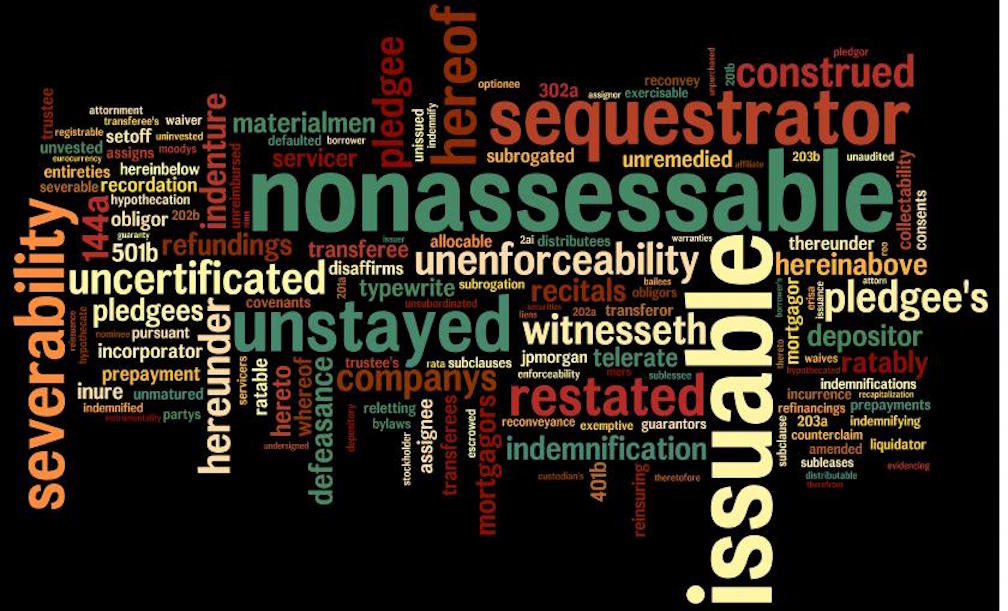Here is the difference between winning Olympic vaults, 56 years apart:
Here are examples of two contract clauses, 56 years apart.
Old:
The parties hereto do hereby stipulate and agree that it is their intention and covenant that this agreement and performance hereunder and all suits and special proceedings hereunder be construed in accordance with and under and pursuant to the laws of the State of New York and that in any action special proceeding or other proceeding that may be brought arising out of, in connection with or by reason of this agreement, the laws of the State of New York shall be applicable and shall govern to the exclusion of the law of any other forum, without regard to the jurisdiction in which any action or special proceeding may be instituted.
New:
The parties hereto do hereby stipulate and agree that it is their intention and covenant that this agreement and performance hereunder and all suits and special proceedings hereunder be construed in accordance with and under and pursuant to the laws of the State of New York and that in any action special proceeding or other proceeding that may be brought arising out of, in connection with or by reason of this agreement, the laws of the State of New York shall be applicable and shall govern to the exclusion of the law of any other forum, without regard to the jurisdiction in which any action or special proceeding may be instituted.
Tear It All Down…Or Not
That’s right! Law is antiquated and never changes! It needs to be torn up and modernized! #Legaltech is here to save the day with automated, A.I.-assisted hragle barblesd….
That’s usually where I start to tune people out and all I hear is:
On some level, I sympathize. A lot of “legalese” is dated. It’s confusing and awkward even for lawyers, let alone regular people. The desire to make things easier for people to understand is laudable. But changing things for change’s sake isn’t good either.
Change should only be made when something is fully understood. A few years ago on Above The Law, I wrote about the Fallacy of Chesterton’s Fence:
In the matter of reforming things, as distinct from deforming them, there is one plain and simple principle; a principle which will probably be called a paradox. There exists in such a case a certain institution or law; let us say, for the sake of simplicity, a fence or gate erected across a road. The more modern type of reformer goes gaily up to it and says, “I don’t see the use of this; let us clear it away.” To which the more intelligent type of reformer will do well to answer: “If you don’t see the use of it, I certainly won’t let you clear it away. Go away and think. Then, when you can come back and tell me that you do see the use of it, I may allow you to destroy it.
Put simply, don’t ever take a fence down until you know the reason why it was put up. It’s no different in a law firm.
Policies and procedures that are in place are likely there for a purpose – another attorney set it up that way for a reason. The same is true with the contract. You might look at something and see it as antiquated, but there is a good chance there is something there you don’t see.
Another lawyer with years of experience and perspective drafted the contract for very specific reasons. They are not looking at it on an individual basis, but how the process has been handled over the course of dozens of cases. The process is designed to address multiple problems that could occur along the way. What might seem inefficient to you could actually be the appropriate amount of due diligence required to make sure something is done right.
Should Lawyers Ditch Legalese?
Yet being aware of the importance of understanding why certain language is used does not mean that it can never be changed. Rather, you should take the time to develop a full understanding of a contract before beginning to change things that have been in place for years.
Alfred P. Sloan, Jr., the chairman of General Motors in its heyday, is attributed with saying the following at a top committee meeting:
“Gentlemen, I take it we are all in complete agreement on the decision here.” Everyone around the table nodded in assent. “Then I propose we postpone further discussion of this matter until our next meeting to give ourselves time to develop disagreement and perhaps gain some understanding of what the decision is all about.”
Unanimity is overrated. Dissent is an essential ingredient in developing thoughts and ideas. Disagreement will present alternatives to the obvious solution. It will challenge the conventional thinking, and force people to carefully consider and examine their position. Regarding contracts, you might say:
Y’all haters corny with that “tested language” mess
Copy-pasters, catch my fly, and my cocky fresh— Ken Adams (@KonciseD) February 29, 2016
That would be Ken Adams channeling his inner KanyeWestLaw in response to watching Beyoncé’s new video:
Because any given deal will likely resemble previous deals, contract drafting is driven by precedent. As such, inertia—Isaac Newton’s “power of resisting”—holds sway. How should I respond to inertia? I could simply put my guidelines out there, and leave it at that. But if you expect to combat inertia by waiting for the hidebound to figure out for themselves the error of their ways, you’re going to have to wait until forever.
That’s why I permit myself to be more assertive. I gently mock the dysfunction of traditional contract language. I police the marketplace of ideas, pointing out that which doesn’t make sense—the more prominent your soapbox, the more astringent my analysis is likely to be. And if you denigrate what I do without good reason, I’ll give as good as I get. (That said, I’ve also been known to eat healthy quantities of crow.)
If you have taken the time to fully understand everything about a contract, know why certain clauses are in place and specific language was used, then you can begin to pick it apart.Do you know your audience? Sometimes certain clients, lawyers, or judges like for things to be as they were “back in their day.” You need to draft accordingly if the recipient of your work is of a traditionalist mindset.
So should lawyers ditch legalese? As with so many issues facing lawyers, “it depends.” Like anything else you do, approach the use of legalese with care and due diligence.
















